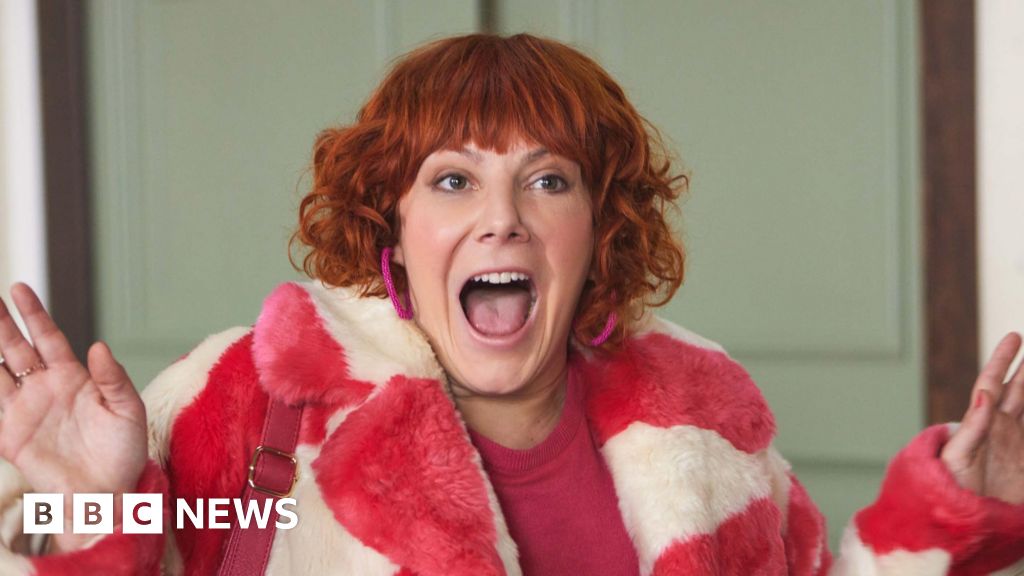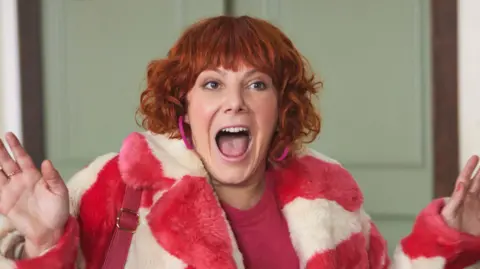 BBC/Expectation TV/Neil Sherwood
BBC/Expectation TV/Neil SherwoodRed hair. Pink fur coat. White helmet. Green tartan trousers. Huffing and puffing uphill on a rickety old bike towards the job centre.
Not quite as graceful as ET on two wheels but that first scene introducing the titular character in Sophie Willan’s sitcom Alma’s Not Normal created an instant connection with a new audience.
It’s over four years since Willan’s semi-autobiographical debut series lifted us during the lockdown gloom. Now the irrepressible Alma (Willan), an aspiring working-class actress from Bolton whose mum Lin (Siobhan Finneran) is struggling with heroin addiction and mental health issues, is back.
For the uninitiated, the premise may sound bleak, but not a bit of it. Pathos might never be far away but humour is always at the forefront.
Having tried her hand as both an escort and a sandwich “artiste” at SubNGo in series one, Alma and her best friend Leanne (Jayde Adams) are on the hunt for jobs, fun and sex in the highly anticipated second series. But this time, cancer also looms large as Alma’s grandma Joan (Lorraine Ashbourne) receives a diagnosis.
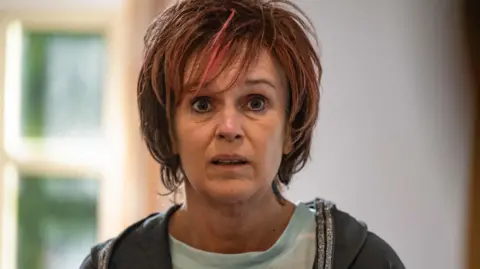 BBC/Expectation TV/Vishal Sharma
BBC/Expectation TV/Vishal SharmaMany aspects of Alma’s life reflect the real-life experiences of Willan, who was brought up by her grandmother Denise, between stints in foster care.
Willan later turned to sex work to make ends meet, but prior to that, she had caught the acting bug while on holiday with Denise in Ibiza at a hotel drama club.
She joined a theatre company in Manchester and set about forming her own, before landing the Caroline Aherne bursary in 2017, which develops new comedy talent. And Alma was born.
Denise died of cancer while Willan was filming the first series of Alma and she dedicated her second Bafta win in 2022 to her zebra print-loving gran.
“The second series was very hard to write, because some of it was stuff that I was currently dealing with rather than stuff that I processed long ago,” Willan tells the BBC.
“I suppose what’s always helped me is finding the political. As soon as it feels political or [it’s] a cultural, social problem, then I get dead angry and that’s why the comedy’s great because it’s anger. And love.”
Her main bugbears are “the mental health system and the care system and all of the cuts to it.
“I wanted to take the state to task. I wanted to show the impact on vulnerable women.
“And what happens to my mum in [the show] is systematic failure. And then also cancer on a more personal [level]… everyone experiences it and we don’t know how to talk about that.”
She explains: “Even though we all seem quite narcissistic in writing, actually you can’t just write about yourself, it has to feel like it’s about something bigger than you.”
She jokes that procrastination is often her biggest enemy. “I lived in a spa for a year!” she giggles. “It wasn’t even conscious, I’d just go around the country, avoiding [writing].
“Which is why you need to pay working class people well.. I get Ubers now!”
Her self-care also includes Merlot, she laughs.
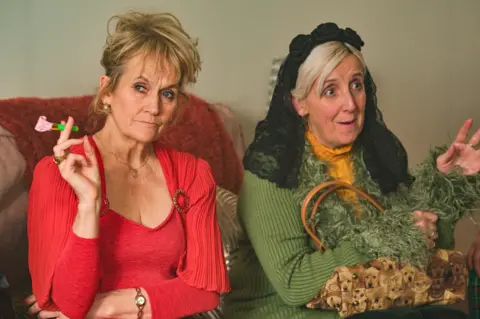 BBC/Expectation TV/Matt Squire
BBC/Expectation TV/Matt SquireSiobhan Finneran, known for roles in hit series such as Downton Abbey, Happy Valley and Benidorm, plays Alma’s mum, an often desperate but funny, angry and tenacious woman who is stuck in the healthcare system’s revolving door as she tries to come off heroin.
“I love the fact that she’s got no edit button,” Finneran says of Lin.
“And the only people I know who are allowed to get away with that are toddlers or… [people] over 80. They sort of lose the ability to edit. And I love that about her because it’s very raw and it’s very honest.”
Ashbourne is also in thrall to her character, who has a tough exterior but a lust for life – and leopard print.
“I wish I was a little bit like Joan. I invited somebody to see the Manchester screening [of the first two episodes of series two]. She had had cancer, and she said, ‘Lorraine, why didn’t you tell me it was about cancer?’
“And I kind of thought, well, it is about cancer. Of course it is. But it’s sort of almost more important that it’s about Joan’s spirit… and the way she tackles it and fights it.”
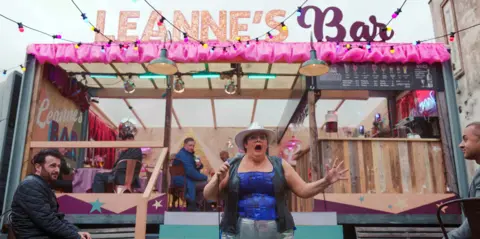 BBC/Expectation TV
BBC/Expectation TVBut while Joan and Lin are a familial force to be reckoned with, Alma’s relationship with her bestie Leanne is arguably the show’s cornerstone.
Willan and Adams first met doing cabaret in 2015.
“The first time Sophie saw me, I was singing Time to Say Goodbye in an Asda uniform,” laughs Adams, who took part in Strictly Come Dancing in 2022.
“And she saw me in a way no-one else in the industry has seen me. Sophie and I are genuine bezzies. And the number of times we’ve been on the Veuve Clicquot… because we’re fancy now. Working class people are allowed to have standards!”
Leanne is confident, optimistic and a grafter. A force to be reckoned with.
“Sophie wrote Leanne with me in mind,” Adams explains.
“She’s like how I hope people see me, but so often in my personal life, when you’re working class, you don’t react to things the way middle class people do. So when I get the word ‘no’ I’m like, ‘Well, why not?’
“My career went crazy, which is absolutely brilliant but it’s also mental. And in that period of time, I had the strength in this person that she’d written for me.
“And to be able to be seen by at least one person in this industry in the way that I actually am, rather than the way that people perceive me, because… I’m nearly six foot [tall] and I’m nearly six foot wide.
“I can’t be apologetic because I look like an apologetic giraffe! It’s just given me real strength and stability.”
Playwright and screenwriter James Graham recently called for more opportunities for working-class people in the TV industry.
Delivering the MacTaggart lecture at the Edinburgh TV Festival in August, he cited figures which suggest only 8% of people currently working in television are from a working-class background.
Graham, who wrote the play Dear England and TV’s Sherwood, referred to class as “everyone’s least favourite diversity and representation category” and said more attention should be paid to social mobility.
Ashbourne tells Willan: “I don’t think there’s anything on TV quite like it. I think you’re a brilliant role model for people that come from challenging or diverse backgrounds. And you don’t settle for ‘no’. You want the best and you are deserving of the best.”
Alma’s Not Normal will be shown on BBC Two (at 22:00 BST) and on iPlayer from Monday 7 October.

